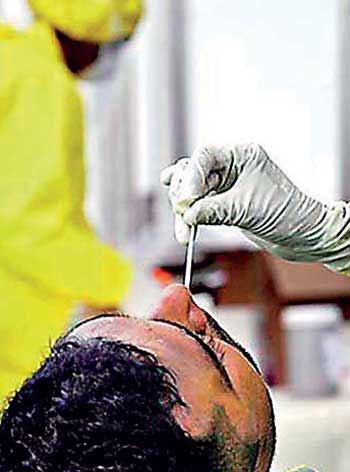Tuesday Feb 17, 2026
Tuesday Feb 17, 2026
Saturday, 5 March 2022 00:39 - - {{hitsCtrl.values.hits}}
 By Shailendree Wickrama Adittiya
By Shailendree Wickrama Adittiya
Daily COVID-19 detections dropped to 583 yesterday, the lowest it has been since January.
According to the Epidemiology Unit, 461 persons tested positive for COVID-19 on 10 January and daily detections have since remained above 600.
All patients detected yesterday were from the New Year cluster, the Department of Government Information states.
A gradual decline in daily detections has been observed this week, with 711 persons testing positive for COVID-19 on Thursday. This includes 710 persons from the New Year cluster and one Sri Lankan returnee from overseas.
However, daily testing has remained below 10,000 since 26 February. The Health Promotion Bureau states that only 4,689 PCR tests and 2,475 rapid antigen tests were conducted on Thursday.
A total of 648,993 COVID-19 cases have been detected in the country. This includes 543,225 persons from the New Year cluster, 82,785 persons from the Peliyagoda cluster, 9,154 persons from the Prisons cluster and 3,059 persons from the Divulapitiya cluster.
The country’s imported cases include 7,235 Sri Lankan returnees from overseas and 328 foreigners.
The Epidemiology Unit states that 135,081 persons from Colombo, 112,612 persons from Gampaha, 57,459 persons from Kalutara, 43,348 persons from Galle and 30,842 persons from Kurunegala have tested positive for COVID-19.
During the third wave of the pandemic, 102,784 patients from Colombo, 94,078 patients from Gampaha and 50,401 patients from Kalutara were detected. At present, 23,006 persons are under medical or home-based care and 816 persons suspected of having COVID-19 are under observation.
The country’s COVID-19 recoveries rose to 609,680 with 195 persons discharged from treatment centres yesterday.
Meanwhile, health experts yesterday emphasised the importance of adhering to safety guidelines and getting vaccinated given the reopening of schools next week.
“When school activities resume, roads get busy and travel increases. With this, there is a rise in COVID-19 as well as other communicable diseases spreading at the moment, like diarrhoea and diseases of the respiratory tract,” Colombo Medical Faculty Professor and Paediatrician Prof. Pujitha Wickramasinghe said.
He explained that there is an adverse impact on the child when they are unable to go to school for an extended period of time and socialise, as seen during the pandemic. While adding that a survey has not been done on childhood obesity since the pandemic, Prof. Wickramasinghe said that he has noticed a doubling of childhood obesity numbers, which is a serious situation.
“Depending on how long they have been obese for and the transformation that happened to their body during this time, they may develop other diseases in the long term,” Prof. Wickramasinghe said. These conditions include heart disease, diabetes and cirrhosis. “This is the unseen side of the COVID-19 pandemic,” he added.